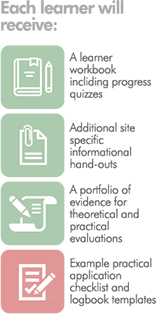 T
The tractor course is designed for both novice and experienced operators who may be expected to operate a tractor and tow various implements and attachments while performing their daily duties.
A learner accredited with this unit standard will be able to demonstrate knowledge of the functions of the tractor and the start-up, shutdown and operating procedures for the machine. The operator will also be able to tow various implements and attachments.
Entry requirements
Candidates must have a grade 7 certificate or equivalent qualification and code B national driver license if operating on national roads.
For any queries regarding the requirements and conditions of tractor training, feel free to contact our skills development advisor for more information.
Earthmoving and construction operations

Tractor operator training
Earthmoving plant operations training
Course content
Tractor familiarisation and workings / functions
We explain why you need to be a professional tractor operator, the functions of a tractor, tractor components and their purposes, and what Personal Protective Equipment (PPE) a tractor operator may be required to use.
Plan work activity and prepare work area for tractor operations
We explain why an operator needs to receive and interpret work activity instructions, identify what is required to plan and prepare work activities, and explain what aspects to consider once on site and preparing to start any work activities.
Tractor checks, starting up, shutting down and parking a tractor
We identify the different checks an operator must do on a tractor, explain the different gauges, how to perform the checks and why, demonstrate how to perform the checks, how to start up, shut down and park a tractor and discuss tractor maintenance.
Operate the tractor
We explain the general operating safety aspects, general site rules, demonstrate brake and steering tests, discuss defensive tractor operating and explain good operating practices.
Tractor implements and attachments
We explain safety related to using implements and attachments with a tractor and demonstrate hitching and unhitching them, as well as towing.
Document tractor use, report and communicate information
We explain the importance of documenting tractor use, reporting faults and problems and communicating information to other role-players.
Assessment methods
We conduct a formative theoretical assessment at the beginning of the course to gauge the learner’s initial understanding (novices only). At the end of the training, a summative theoretical and practical application assessment is conducted, to find if the learner is competent; if not, additional developmental areas are identified and suggested.